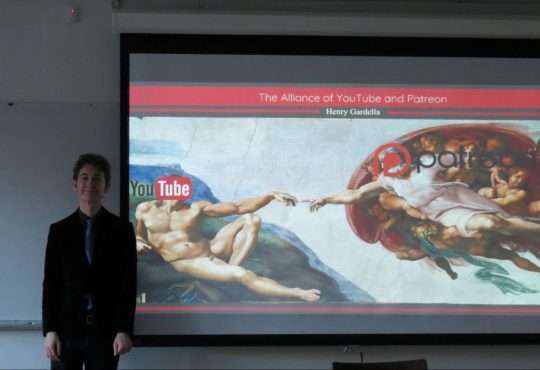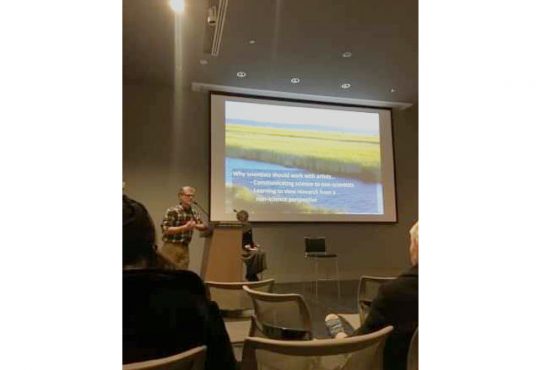
Richard Linklater’s cult classic “Before Sunrise” is arguably the most romantic movie to come out of the ’90s. It’s an obvious choice for a date night on Valentine’s Day. A less-obvious choice is listening to a biology lecture about lizard reproduction.
On Valentine’s Day as a part of “Science on Screen” at the Grand Cinema in Tacoma, Dr. Stacey Weiss of Puget Sound’s biology department gave a presentation called “Brighter females are better: A lizard tale of flashy females and discriminating males” at 6:45 p.m. prior to the showing of “Before Sunrise.” “Science on Screen” invites viewers to listen to a science-related talk before showing a movie which in some way relates to the content of the lecture.
Dr. Weiss presented her PhD thesis work on female-specific traits in lizards and what they indicate about sexual selection. Sexual selection is essentially when an animal selects a mate based on certain traits. The most obvious example of sexual selection is found in the behaviors of male peacocks and female peafowls.
When attempting to woo a peafowl, peacocks will literally dance for love. The dance is meant to show off their beautiful feathers, because the duller-colored peafowls generally pick mates with the largest, most vibrant and most heavily marked feathers.
“It ends up that variation in characteristics in male plumage honestly indicate the male’s quality. So, by expressing this preference, the female actually gets genes from a higher-quality mate, and her offspring have higher survivorship,” Weiss explained.
This display is not only colorful, but it is also a considerable risk to the male, who is vulnerable to predators during this courtship. This vulnerability takes on a whole other dimension in species such as peacock spiders, who also dance for love.
“Doing things like this is expensive, energetically expensive, and risky in terms of predation. If I can return to those lovely peacock spiders for a minute, another risk for spiders and other species is if a male is doing this display and a female is not interested, she may very well eat him. And that’s a serious risk,” Weiss said.
The idea that flashier traits in males can indicate their health to the choosier female is a well-accepted and studied theory. However, many female animals also show their own unique color characteristics, yet little work has focused on female traits.
This is why Weiss began researching the Striped Plateau lizard, a species found in a small number of discrete mountain ranges in Mexico. Female Striped Plateau lizards’ coloring changes based on their reproductive cycles, becoming more vibrant as they enter peak fertility.
“The story that I want to tell you is a little bit about my data, data that suggests whether or not the female color actually functions as a signal. Is there information content there? Is she providing information about her quality, and do males care?” Weiss asked.
Weiss and a team of Puget Sound students diligently studied these lizards, tracking their health versus their coloring. Weiss’s results clearly showed that the more vibrant the female’s coloring, the healthier she is.
“Variation in color expression is able to reliably predict things about female body size, snout length, body condition, mite load … stress levels and age. … So a lot of information is potentially held within variation and the color expression,” Weiss said.
Not only do more vibrant females indicate health, but the more vibrant the female, the more desirable she becomes to her male lizard friends and the more likely they are to court her. Additionally, male lizards become more competitive and aggressive in the presence of vibrant females.
So what do lizards and young couples falling in love in Europe have in common?
The dialogue-heavy “Before Sunrise” follows the story of two young people played by Ethan Hawke and Julie Delpy as they meet and fall in love in Vienna, Austria. Among their many conversations, the differences between men and women is a recurring theme.
“Women say they hate it if you’re all territorial and protective, but if it suits them, then they’ll tell you they’re being all manly,” Ethan Hawke’s rather naive character says at one point in the film.
“Men are lucky we don’t bite off their head after mating — certain insects do that, you know, like spiders and stuff. We at least let you live; what are you complaining about?” Julie Delpy’s character responds.
“Science on Screen” and Dr. Weiss were able to combine science and romance for an unexpected and hilarious evening. It turns out that biology can be romantic and romance can be scientific.



